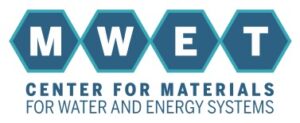Sponsored by the Eastman Kokak Company
Professor Benny Freeman of the Chemical Engineering Department at University of Texas at Austin and Dr. Ingo Pinnau of Membrane Technology and Research (MTR) are winners of the 2002 Award for Cooperative Research in Polymer Science and Engineering presented by the American Chemical Society’s (ACS) Division of Polymeric Materials: Science and Engineering (PMSE). Dr. Brian Benecewicz, Chairman of the PMSE Cooperative Research Award Committee, announced the award, which has been presented annually since 1992, when it was endowed by a gift from the Eastman Kodak Company to PMSE.
Dr. Freeman, Professor of Chemical Engineering at the University of Texas at Austin, and Dr. Pinnau, Principal Scientist at MTR, won the 2002 award based on sustained, significant contributions in the areas of gas, vapor, and liquid separations using polymer and polymer-based membranes. Their pioneering research has identified fundamental limitations of existing membranes and led to new materials that elegantly circumvent these limitations. For example, they identified new polymers and polymer-based nanocomposites that, in contrast to conventional polymer membranes, are much more permeable to larger, more soluble molecules (e.g., n-butane) than to smaller molecules (e.g., methane). Membranes prepared from such polymers enable selective separation of volatile or toxic organic vapors from air gases and removal of condensable hydrocarbons from natural gas for dewpoint and heating value control. They have recently conceived of and reduced to practice the concept of applying thin (<1 µm), nonporous coatings of self-assembled block copolymers to the surface of conventional porous membranes for water treatment. These coatings reduce membrane fouling by more than 90% in some applications, such as purification of oily wastewater. Advanced membranes for drinking water production may also benefit from this approach.
Since 1994, their cooperative research has resulted in more than 25 joint publications, two ACS Symposium Series books, many jointly led conferences and symposia, more than 4 million dollars of Federal research support for cooperative research projects between Professor Freeman and Dr. Pinnau, more than 20 joint oral presentations, and significant advancement of the field of novel separations using polymer membranes. Evaluators of the nomination were impressed by the quality of the scientific contributions and by the breadth of joint activities. Professor Freeman is a recognized leader in the science of small molecule transport in polymers. Fundamental research in his laboratory bears directly upon membranes for liquid, gas, and vapor separations; controlled drug delivery devices and techniques; barrier plastics for food and specialty packaging; monomer and solvent removal from formed polymers; and physical aging of glassy polymeric materials and membranes. The National Science Foundation, National Academy of Engineering, the ALCOA Foundation, and the Japan Society for the Promotion of Science (JSPS) have recognized his research. Dr. Pinnau is an authority on polymer-based membranes for separations applications. He directs the materials and membrane production group at MTR, and he has developed a variety of polymeric, solid polymer electrolyte, metal, and nanocomposite membranes for next-generation separation applications in the chemical, petrochemical, and allied industries. He holds 22 U.S. patents and has been honored three times by his selection to receive a prestigious JSPS Fellowship.
The awards, which each include a $1500 prize, will be presented at PMSE’s awards luncheon at the Spring 2002 American Chemical Society meeting in Orlando, Florida.
For more information, contact Brian Benicewicz, Rensselaer Chairman, PMSE Cooperative Research Award Committee

